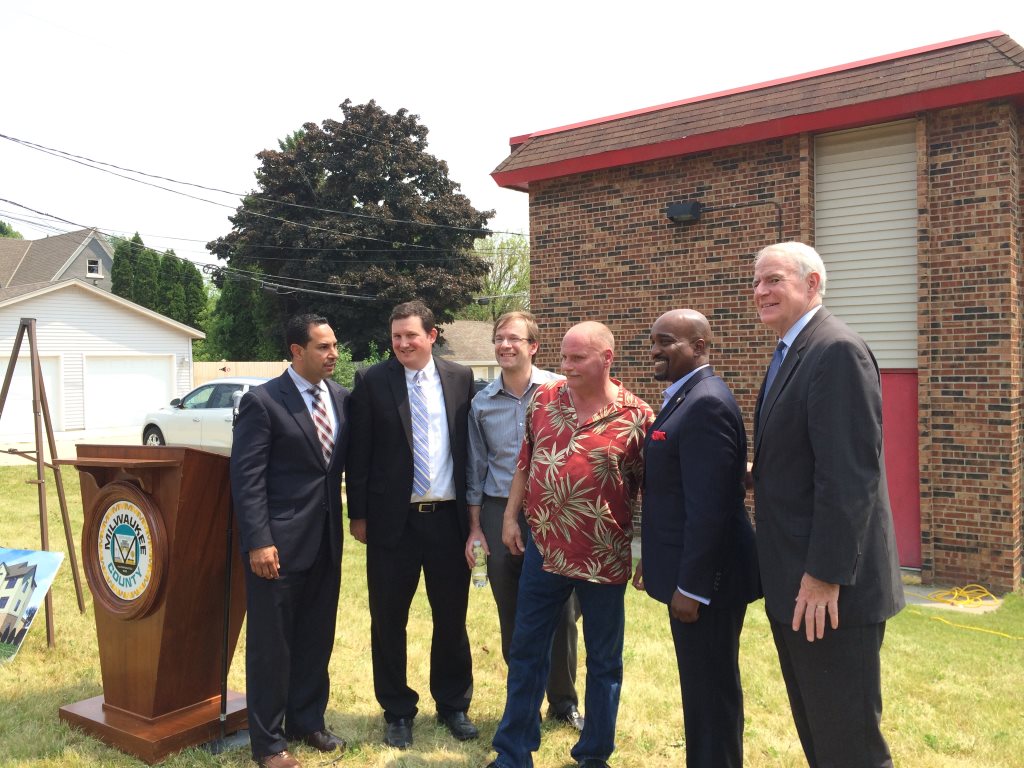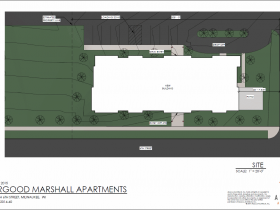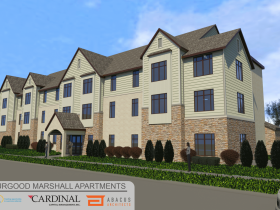An End to Chronic Homelessness?
That's the aim of a new joint county/city venture led by Chris Abele.

Hector Colon, Jim Mathy, Chris Abele, Mark Hilton, Antonio Riley and Tom Barrett. Photo by Hayley Keith.
When Milwaukee County Executive Chris Abele was first elected in 2011, he promised he’d have a good relationship and work together with Milwaukee Mayor Tom Barrett. Historically, there has been little cooperation between the mayor and county exec in Milwaukee. But a bold plan announced last week by Abele and Barrett to “end chronic homelessness” in Milwaukee is a good example of teamwork between the two leaders, even at a time where there are reports of tension between them over the Bucks arena issue.
The plan announced last week at the site of the new Thurgood Marshall Apartments (1918 N. 6th St.) is based on the “Housing First” model, which essentially posits that, despite often having many other needs, a homeless individual or household’s first and primary need is to obtain stable, affordable, quality housing. “By implementing the Housing First model in our community, we will be able to immediately place homeless individuals directly into permanent housing,” said Jim Mathy, Milwaukee County Housing Division Administrator. “Not only will this be a life-changing event for those experiencing homelessness, but national data shows that implementing Housing First also results in savings from reduced public service costs.”
Abele wants to use this approach to end chronic homelessness in three years. The Housing First plan will be implemented starting in July, and is modeled after New York City, the first city to successfully launch the Housing First model. “The data from New York City is really powerful…we know this model works, we know it’s cost effective…and we know we can do it,” says Mathy.
Barrett echoed Abele in explaining the approach: “For decades the mindset has been for people who are homeless we need to get them the services to move from transitional housing…to permanent housing,” he said. By contrast, he noted, the Housing First model aims to give homeless people homes first and then the services they need to combat alcohol issues or mental health issues. A person is considered chronically homeless if he/she has experienced homelessness for a year or more, or has experienced at least four episodes of homelessness in the past three years and has a disability.
Barrett noted that the city has allocated $960,000 for the project, including $600,000 from the community development block grant dollars and $360,000 from the housing authority rent vouchers. “The city comes in with the house and the county comes in with the services…the power of this is partnership,” Barrett noted.
The initial goal is to serve approximately 300 people immediately. Over 200 units of permanent support housing will be put into place at the start of the program to help achieve that goal. The Housing First model emphasizes there is no time limit on the how long a resident can stay in the housing. There will be services in the form of case studies for each of those served, and Mathy says “supportive services are just as important as the housing itself.” The services associated with the housing plan are primarily geared toward help for those with alcohol abuse issues.
Also present at the press conference was the Midwestern Regional Administrator of the federal Housing and Urban Development agency, former Wisconsin state Sen. Antonio Riley. Riley noted that HUD awarded $1.8 billion to local homeless programs last year, of which $23 million went to Wisconsin and $11 million of that total went to Milwaukee. Riley explained that one person experiencing chronic homelessness can cost the community $30,000 to $50,000 per year in hospital visits and incarceration. Based on this research, he noted, “we cannot afford not to end chronic homelessness.”
Riley believes that the success of the program to help homeless veterans find housing offers more evidence that the Housing First model works. As he put it, “housing should be a platform to change lives and that’s what Housing First is all about.”
Thurgood Marshall Apartments Design
Political Contributions Tracker
Displaying political contributions between people mentioned in this story. Learn more.
- February 10, 2016 - Tom Barrett received $400 from Steve Mahan























I have the answer to the homeless problem. Some how people just talk and never do anything about the homeless problems. Just know Gpd is watching all of us
!!!!!!
Wait what’s the answer? Gpd?
I know of a place were a couple of tiny homes could be put up and/or a couple of vans or trucks with bed tops on them could park. The owner of the property is also interested in helping someone start a handyman, landscape, construction, business etc. out of the commercial property.
Property is located in a nice suburb of Milwaukee. Less than a mile to the freeway.
NO drugs or drinking.